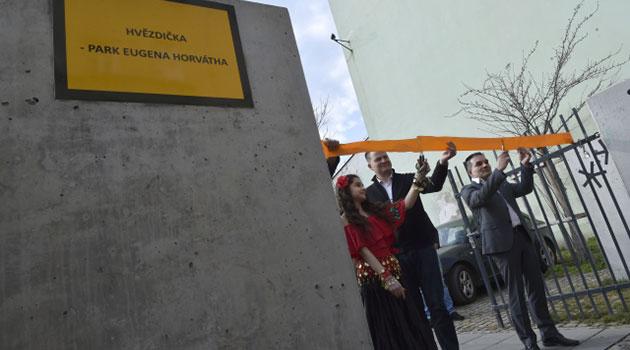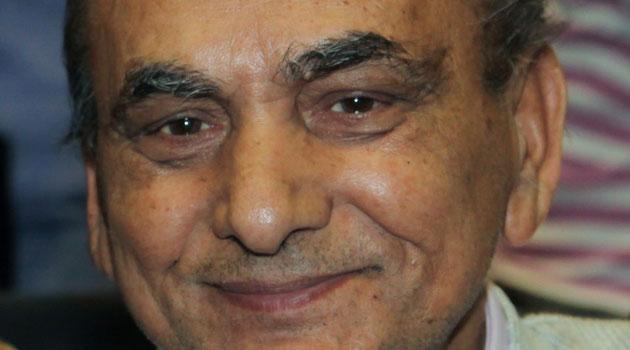Czech city names first-ever public place after Romani figure

The City of Brno is the first to name a public location in the Czech Republic after a Romani figure. On 27 March the name of the Hvězdička Park was officially changed to Eugen Horváth Park.
The park was renamed after the renowned musician by a City of Brno assembly resolution in December 2017 on the basis of a civic initiative from the local Romani community. The grand re-naming ceremony was organized by the “DROM, Romani Center” on 27 March at 16:00 directly at the park (Hvězdová 9).
Alica Heráková, spokesperson for DROM, said during the ceremony that it was the first public space in the Czech Republic to be named after a Romani figure. “The initiative arose spontaneously when a group of Romani people came to see me in 2015 who wanted to create a memorial to Janko Horváth,” DROM director Miroslav Zima told the Czech News Agency.
Local performers scheduled to appear during the event included the dance ensemble Piroš rouža, the “Cembalom Music of Milan Horváth” ensemble, and the Harmonic Play group. DROM has been striving to rename a public place after Eugen Horváth for several years.
The first idea was to hold a concert, but Zima had the idea of attempting to name the street in the Husovice neighborhood where the musician lived after him. “We attempted it in the Brno-sever municipal department to rename Dačického Street, which is where Janko Horváth lived, but it was not approved. In 2016 our request to rename the park was not approved either, but we tried one more time,” he said previously.
Re-naming a street is always a bit more complex of a process because 80 % of the residents must agree to the change. “The address of the park is the seat of our center only, so that condition was fulfilled without any problem,” Zima said.
Last year the idea was supported by a petition with roughly 300 signatures and succeeded.”We want Romani people to feel at home here, to take care of the place, to cultivate a relationship toward it, and for the city to perceive the Roma as their fellow citizens,” Zima said.
The director wants to support more such projects in the future. During the celebration organizers unveiled a memorial plaque.
Mr Horváth, nicknamed “Janko”, was a unique figure who was famous during his own lifetime as a musical legend and a genuine proponent of the traditional values of Romani culture. He especially lived through music and his entire life was lived in harmony with his refined displays of culture.
The noble finesse of which he was capable was apparent not just in his music, but also in his language, as he maintained perfect knowledge of his mother tongue, Romanes, in addition to speaking Czech. Together with his band he was primarily a representative of the ancient, indigenous musical aspect of the folk art of Roma from Slovakia, as well as partially a representative of the Hungarian Roma music style.
His grandfather Jožu Horváth was a blacksmith and musician, and his father, Ondrej Horváth, called Andy, was a respected band leader who ran a family music ensemble together with his brothers and cousins. Eugen Horváth was born on 26. 3. 1940 in the town of Nálepkovo (Vondrišľa) in Slovakia and tried playing the violin from childhood.
He inherited his musical aptitude from his father and began to play more actively under the direction of his father at the age of 14. The family moved to Brno in the Moravian part of Czechoslovakia in 1947.
His musical talent led him to study at the Brno Conservatory, but he left that school after the first year. He applied himself as a violinist in the Brno dance band “Raxi”, led by his brother Ondřej Horváth, Jr, and also played in the cembalom groups of Romani traditional musicians.
The Union of Gypsies-Roma was created during communism (as part of which he was active musically) and in 1969 he created his own, renowned “Cembalom Music of Eugen Horváth” ensemble, which he led and which became one of the most outstanding ensembles performing the music of Romani tradition, and not just in Moravia. The ensemble included his siblings Ondřej (clarinet) and Alois (viola) Horváth, as well as Florián Kotlár (violin), Štefan Karvay (viola), Rudolf Borák (double bass) and the permanent member Josef Bagár, nicknamed “Huľo”, who played accordion and cembalom.
The excellent cembalom player Ján Gašpar Hrisko occasionally performed with the ensemble too, as did his sons Jan and Ivan Gašpar, and another permanent member of the ensemble was the clarinet player Jozef Krajčovič. For many years the Bagár brothers – Ján (double bass), Rudolf (viola), and Milan (nicknamed Beňo – accordion and cembalom) also performed in the ensemble.
That ensemble performed in several documentary films and television programs. Eugen Horváth also taught his own children the art of music.
In the 1990s he brought his children into the ensemble, which was gradually transformed into a family band. He gradually handed the baton over to his gifted son Milan, under whose direction (and name) the Horváths now present their art.
The musical “genes” have been inherited by his sons Eugen (double bass) and Petr (cembalom), while his daughter Lenka is a solo vocalist with the band. Vanesa Horváthová, his 17-year-old granddaughter, spoke on behalf of the family at the celebration.
She took care of her grandfather during the final years of his life and is studying medicine. “He was a source of inspiration for me and will always be in my heart,” she said in an emotional speech.
Mr Horváth used to lead the folk music ensemble at DROM and trained many Romani musicians there. He used to tell his charges that Romani music flows from the soul.
Eigen Horváth passed away in October 2014 at the age of 74. That same year the Museum of Romani Culture posthumously awarded him a prize for lifetime achievement in memoriam.
